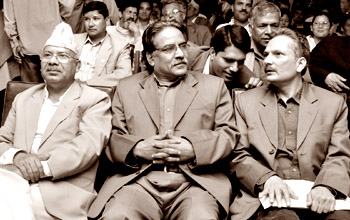Need to take a leaf from Nepal

|

Nepalese Maoist rebel leader Prachandra (centre), deputy leader
Baburam Bhattarai (right) and General Secretary, Nepalese Communist
Party United Marxist Leninist, Madhav Kumar Nepal, (left) attend
Prime Minister Girija Prasad Koirala (not in the photo),
administering the oath of office to Ministers in Katmandu, Nepal on
April 1. Former communist rebels joined an interim government in
Nepal as part of a landmark peace deal that ended a decade-long
insurgency, pledging to ensure development in the Himalayan nation
and to hold credible elections. (AP)
|
While there was near unanimity among the 'SAARC Eight' on the need to
contain terrorism at the recently concluded 14th SAARC Summit in New
Delhi, it was left to Nepal to freshly indicate an appropriate approach
to resolving the problem most cost-effectively.
"We have managed to bring the Maoists to the mainstream. A new
chapter is going in Nepal," Nepal's ageing Prime Minister Girija Prasad
Koirala was quoted as telling the SAARC Summit last Tuesday.
"I wanted to have a dialogue with the Maoists but was told by many
that 'terrorists are not to be believed'... Now they have come within
the democratic framework and the situation has calmed down," Koirala
explained. He went on to say that he had gambled his 60-year political
career to arrive at an agreement with the Maoists.
At the time of writing, the Maoists have accepted several portfolios
in the Nepalese cabinet and have made the crucial transition from armed
guerrilla fighters to democratically-oriented politicians who are
willing to conform to the norms of representative governance.
If all goes well they will be sharing power at the Nepalese centre
with the Nepali Congress and its allies.
Nepal, then, has joined India in containing the terror menace by
meeting the power aspirations of disaffected groups. India's State
divisions are based on this principle of giving ethnic groups reasonably
extensive autonomy within the Indian Union.
The Nepalese example, however, is strikingly noteworthy on account of
the prolonged and horrific bloodshed which came to be associated with
the Maoist rebellion. Apparently power sharing is delivering Nepal from
its wasting, years - long conflict.
Hopefully, therefore, the Nepalese example would highlight the
advisability of containing terror in South Asia by adopting political
means rather than military means.
Considering that political terror afflicts almost every country in
the SAARC region, it is exceedingly important that the 14th Summit laid
notable emphasis on alleviating the economic and material burdens of the
ordinary people of South Asia, while calling for speedy action for
concluding a Comprehensive Convention on International Terrorism.
Accordingly, the SAARC Eight pledged to launch cross-border projects on
subjects such as water, energy, food and the environment, besides
launching far-reaching initiatives which touch on the lives of the
people, such as, the SAARC Development Fund, the SAARC Food Bank and the
SAARC Arbitration Council, which will aim at promoting cross-border
trade. Referring to the cross border projects, Indian Premier and SAARC
Chairman Manmohan Singh was quoted saying that: "We have agreed to make
tangible progress in the next six months on four issues which affect the
daily lives of our people."
This is far-seeing thinking on the part of SAARC. It is an
acknowledgement of the close bearing material discontentment and
economic want has on socio-political unrest.
Rather than siphon huge development funds into military campaigns to
end political terrorism, it would be more cost-effective to blunt terror
through sustained development and a war on want. Thus does economics
eclipse politics in the SAARC arena.
These policy positions by SAARC are a vindication of the path chosen
by Nepal to end its long-running insurgency.
It should be remembered that the Maoist rebellion in Nepal was almost
entirely fuelled by economic want and poverty.
By integrating the Maoists into mainstream politics and by providing
them a share in governance, the Nepalese government is going a
considerable distance in ending the powerlessness of the poor. If all
goes well, this would end the Maoist rebellion.
Thus, the Nepalese experience in conflict - containment needs to be
considered a high-water mark in the region's turbulent politics.
Hopefully, it would be studied and replicated.
[email protected]
|
